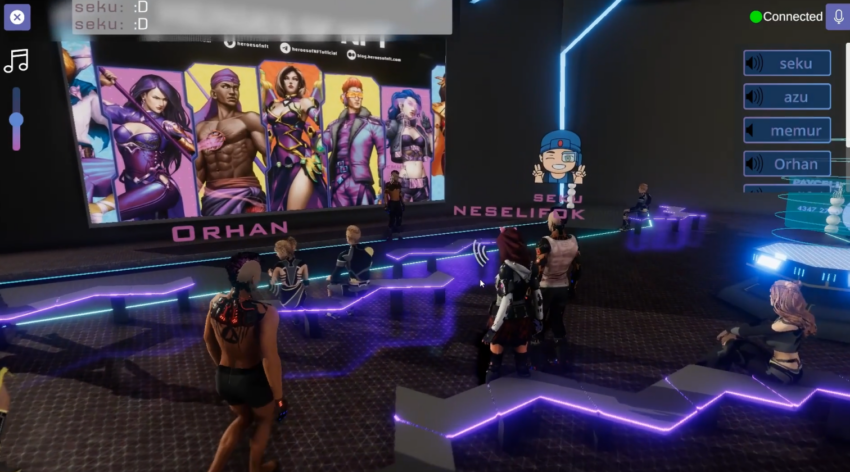The crypto bear market of 2022, which is set to extend into 2023, has seen a sustained decline in market prices for almost all cryptocurrencies. Characterised by a period of continuous downwards price action, the reduction in market values has impacted more than just profits; it has had a domino effect on major project developments, NFT collection drops, and metaverse land sales.
However, where there is a crash, there is an opportunity. Many of the world’s greatest investors have been bullish when others are bearish, just ask George Soros, Warren Buffett, and John D. Rockefeller. Risk and reward go hand in hand, with those not taking risks not exposing themselves to the potential rewards they may withhold.
When it comes to the purchase of digital land, Bloomberg summarises the current state of the market quite neatly, saying “The once-hot market for metaverse land is attracting risky bets”, before adding “virtual property has become an investment strategy for some, even as values have tumbled alongside cryptocurrency prices”.
In this market, timing is everything, and while we are not advocating the purchase of any investment (DYOR), we will be exploring digital land investments post-market crash in this article.
What is Digital Land or Virtual Real Estate?
For those who aren’t fluent on the ins and outs of owning space in the metaverse, digital land is a form of blockchain-based virtual real estate that allows users to own, trade, and monetize their assets. Similar to buying and selling physical real estate, your ownership is proven and transferable, but depending on the metaverse, you have the added benefits of being able to build virtual cities, games, social spaces, and other digital experiences.
Also like the real world, digital space offers scarcity. Many might ask “If the potential of the metaverse is limitless and infinitely expandable, why does it hold financial value?” Each metaverse builds and codes a finite amount of digital land, creating the scarcity required for value. So, in theory, much as is the case in the real world, when a metaverse grows in popularity, as a good neighbourhood or location might, the supply and demand mechanics create a rise in perceived value and price.
Is a Bear Market a Good Time to Buy Digital Land?
Speculation is a key part of why markets work as they do, why they gather interest, and why they are hubs of opportunity. The cryptocurrency market may have taken a downward turn, with metaverse land prices falling alongside it, but that decline is a symbol of opportunity to many investors. Pessimism for the majority creates a sense of opportunity for the bullish, who often talk about buying the dip. The dip, of course, suggests that prices are due to rise, however, in a bear market, prices will continuously fall until they reach a bottom point and start to recover – thus, timing this and finding the dip is incredibly challenging.
Is a bear market a good time to buy land? Are market prices going to recover? Are projects simply delaying their launches until the market makes a sharp recovery? So many questions offer only subjective answers, each different depending on the perspective of those answering. It is a waiting game to discover where the market will go next.
During a bear market, many explore alternative strategies, such as Dollar Cost Averaging (DCA) into assets, which can also apply to digital real estate, however, this comes with great risks. For those not looking to capitalise on this investment financially, but rather because of the technological opportunities it presents, utility is the next topic of discussion.

What Can You Do With Digital Real Estate?
Digital real estate is usually bought, sold, and traded as NFTs – non-fungible tokens. So, 1 NFT = 1 piece of land. With that NFT, you can do many things beyond simple digital ownerships, such as fractional ownership, NFT rental, staking, creating virtual worlds, purchasing digital collectables, gaining access to exclusive or gated content, starting virtual businesses or services, and even more.
Depending on the metaverse in question and how they have designed their real estate and NFTs, there are a number of ways to make this profitable. Since virtual real estate can be used to collect virtual rent payments from tenants in some metaverses, that’s an option. Buying and selling the digital land is another option, flipping real estate and profiting on the margins, though this is considerably more difficult in a bear market. Digital real estate could simply be one more holding to diversify your portfolio and gain access to a new asset class and the potential that comes with it. In truth, the limits to what can be done have not yet been fully discovered.
What Separates the Heroes of NFT Land Sale
Heroes of NFT is due to launch their metaverse ‘Phosphania’ soon, and whilst it’s their first venture into the metaverse space, the foundations that it is built upon give us confidence in the success of the project. Firstly, Heroes of NFT, or HON as its huge community calls it, has already proven successful in the NFT market, selling a 16,000-strong collection to be used in a collectable trading card game. This card game is played by over 30,000 people, most of whom are keen to see where the storyline goes and explore the metaverse.
One of the things that causes many cryptocurrency-related projects to fail is that they adopt a “build it and they will come” mentality, believing that simply launching a good technology is a guarantor of success. The reality in GameFi and Web3, the crossroads where metaverses exist, is that there needs to be community and utility first, before the novelty and intrigue of the metaverse.
Heroes of NFT is an established project and their venture in metaverse building and land sales is not their first ambitious project. The foundations are in place, the technology is proven, the community is large, and the marketing and storytelling are engaging and transparent. This is what separates HON from other projects set to launch their metaverses in 2023 with no provable history of success in this space.
What also sets apart HON and Phosphania from other metaverse projects is their approach to the land sale. Visitors to the space station will get a chance to use and experience the metaverse before the land sales – typically the land sale comes first to fund the metaverse development. This is a unique approach, and once live, will leverage DeFi to allow for staking of land NFTs to earn back investment costs. Users will also have the opportunity to stake HON tokens with their land NFTs to make further gains. Further down the road, you’ll be able to customise your land visually.
Verdict: A Risk Worth Taking?
A reminder that this is not investment advice. Rather, it’s perspective advice. There are so many ways to see the evolutions of a downward market, with many seeing opportunities and others cashing out their bags to avoid further decimation. When it comes to land sales, consider how you might buy property in real life. Would you buy when house prices are cheap, or wait until they are rising? Historical trends could be your ally, but in a new space such as metaverse, there’s little data to work with.
Crypto real estate could be a great long-term investment, but it could also be a bad one, that is a question of timing, backing the right project, and having diamond hands. The market is young, so it can be seen that there is plenty of potential for growth and appreciation, whilst a diversified portfolio is seen as an advantage by many investors. There are the additional benefits of staking, rentals, and fractionalized ownership to consider too.
Just like physical real estate offers no guarantees of profit, those who buy in at a good price can often benefit from price appreciation or commercialisation (renting it out). Early mover’s advantage in the real estate market allows investors to buy properties cheap before they are built and the neighbourhood is thriving – digital land sales offer the same benefit.
Going all in on any asset is unwise, and that’s the case too for metaverse lands, so consider dipping your toes, learning how it works, and becoming an educated digital land investor for when the market does pump and recover. When that scenario comes true, you will be well positioned to make your move.
Disclaimer
In compliance with the Trust Project guidelines, this opinion article presents the author’s perspective and may not necessarily reflect the views of BeInCrypto. BeInCrypto remains committed to transparent reporting and upholding the highest standards of journalism. Readers are advised to verify information independently and consult with a professional before making decisions based on this content. Please note that our Terms and Conditions, Privacy Policy, and Disclaimers have been updated.


